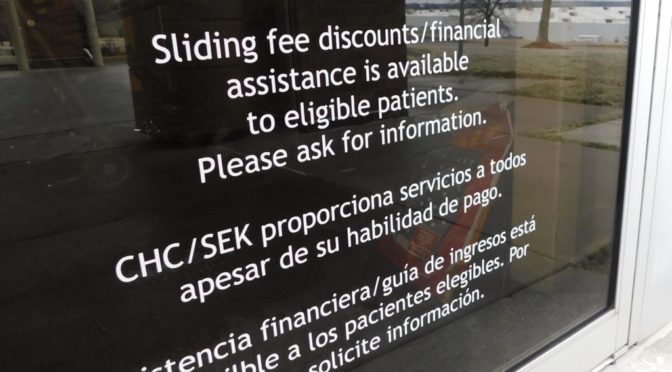
Homemade masks are being advised now for the general public
Robert Poole, Communication and Marketing Director for CHC sent this information directly from National Public Radios’s web page:
The CDC is now recommending people consider wearing cloth face coverings in public settings where other social distancing measures are difficult to maintain, because there is increasing evidence that the virus can be spread by presymptomatic and asymptomatic carriers.
To view the way to make homemade face masks from household items, click below:
https://www.youtube.com/watch?v=tPx1yqvJgf4&feature=emb_title
These new policies come with the vital plea that people don’t use the medical-grade masks that are in short supply in hospitals right now.
On Community Health Center’s Facebook page recently, a patient who was a woodworker donated his n95 respirators to CHC for medical personnel.
Poole also responded to the following questions:
What other occupations would have the medical-grade masks?
Poole said he took the following information directly from National Public Radio’s story on masks from their web page.
Construction businesses and contractors
– Woodworking shops
– Manufacturing plants and factories
– Landscapers
– Auto shops/body shops
– Painters: The masks do not protect against paint fumes, but are used as dust masks during sanding.
– Nail salons: The masks do not protect against chemical vapors, but protect against acrylic powder or dust from filing artificial nails.
– Hardware stores and tool retailers: Harbor Freight is donating its entire supply of personal protective equipment.
– Mold remediation companies
– Cleaning companies: However, many cleaning companies are facing intense demand for sanitation services because of the coronavirus crisis and may need their masks to protect their own vulnerable workers.
Where can people take donations if they have them?
“Any CHC/SEK location will gladly accept donations of N95 masks.”
What about the homemade masks people are making for medical personnel, are they effective?
” In order to reserve our supplies of medical masks, we have instituted the use of homemade masks in non-patient care areas,” Poole said.
Poole provided the following from the NPR wedsite:
Can public face-coverings prevent the spread of the virus?
The primary benefit of covering your nose and mouth is that you protect others. While there is still much to be learned about the novel coronavirus, it appears that many people who are infected are shedding the virus – through coughs, sneezes and other respiratory droplets – for 48 hours before they start feeling sick. And others who have the virus – up to 25%, according to Centers for Disease Control and Prevention Director Dr. Robert Redfield — may never feel symptoms but may still play a role in transmitting it. That’s why wearing a mask even if you don’t feel sick can be a good idea.
If you cough or sneeze, the mask can catch those respiratory droplets so they don’t land on other people or surfaces. “So it’s not going to protect you, but it is going to protect your neighbor,” says Dr. Daniel Griffin at Columbia University, an expert on infectious diseases. “If your neighbor is wearing a mask and the same thing happens, they’re going to protect you. So masks worn properly have the potential to benefit people.”
If I’m wearing a mask and someone sneezes on me, would the mask offer some protection?
Yes. But only if you use the mask properly and don’t touch it with your hands afterward. Those droplets from a cough or sneeze would hit your mask instead of your mouth and nose — good news. But the next step is to take the mask off by the ear bands and either wash or discard it — without touching the front of it. If you touch the front of the mask, whatever that person coughed or sneezed on it is now on your hands.
One other thing: Ideally you would have eye protection, too, to keep that stranger’s sneeze from getting in. Glasses and sunglasses aren’t perfect but can help.
What about homemade masks?
Some research has shown that cotton T-shirt material and tea towels might help block respiratory droplets emitting from sick people — though it’s not clear how much protection they provide.
How often do I need to wash it?
Griffin says to think of a mask as like underwear: It needs to be washed after each use. “You don’t take this dirty mask off, put it in your purse and then stick it back on your face,” he says. “It’s something that once you put on, is potentially either touching your coughs, sneezes or the spray of your speech, or protecting you from the coughs, spray, speech of other people. And now it’s dirty. It needs to basically be either discarded or washed.”
